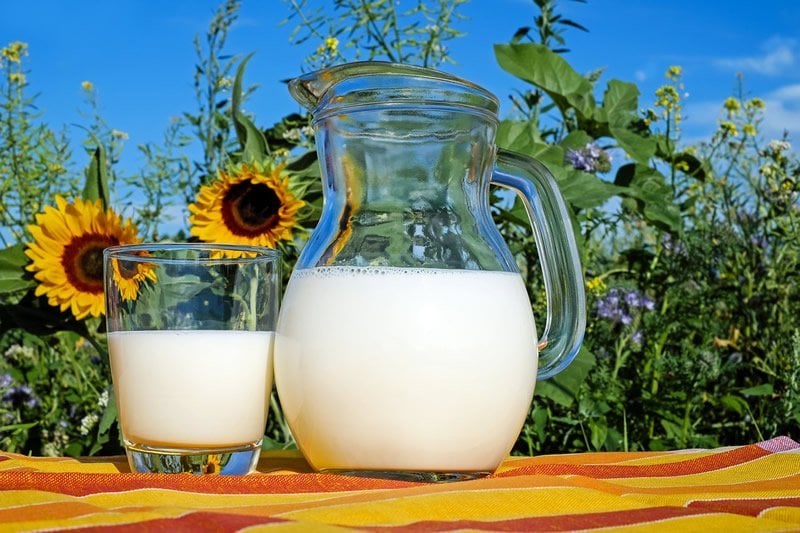Summary: Children who drink whole milk are 40% less likely to be overweight or obese compared to children who consume reduced-fat milk.
Source: St. Michael’s Hospital
A systematic review and meta-analysis led by St. Michael’s Hospital of Unity Health Toronto found children who drank whole milk had 40 per cent lower odds of being overweight or obese compared with children who consumed reduced-fat milk.
The research, published in The American Journal of Clinical Nutrition, analyzed 28 studies from seven countries that explored the relationship between children drinking cow’s milk and the risk of being overweight or obese. None of the studies – which involved a total almost 21,000 children between the ages of one and 18 years old – showed that kids who drank reduced-fat milk had a lower risk of being overweight or obese. Eighteen of the 28 studies suggested children who drank whole milk were less likely to be overweight or obese.
The findings challenge Canadian and international guidelines that recommend children consume reduced-fat cow milk instead of whole milk starting at age two to reduce the risk of obesity.

“The majority of children in Canada and the United States consume cow’s milk on a daily basis and it is a major contributor of dietary fat for many children,” said Dr. Jonathon Maguire, lead author of the review and a pediatrician at St. Michael’s Hospital.
“In our review, children following the current recommendation of switching to reduced-fat milk at age two were not leaner than those consuming whole milk.”
Dr. Maguire, who is also a scientist at the MAP Centre for Urban Health Solutions, next hopes to establish the cause and effect of whole milk and lower risk of obesity in a randomized controlled trial.
“All of the studies we examined were observational studies, meaning that we cannot be sure if whole milk caused the lower risk of overweight or obesity. Whole milk may have been related to other factors which lowered the risk of overweight or obesity,” Dr. Maguire said.
“A randomized controlled trial would help to establish cause and effect but none were found in the literature.”
Source:
St. Michael’s Hospital
Media Contacts:
Jennifer Stranges – St. Michael’s Hospital
Image Source:
The image is in the public domain.
Original Research: Closed access
“Whole milk compared with reduced-fat milk and childhood overweight: a systematic review and meta-analysis”. Jonathon Maguire et al.
American Journal of Clinical Nutrition doi:10.1093/ajcn/nqz276.
Abstract
Whole milk compared with reduced-fat milk and childhood overweight: a systematic review and meta-analysis
Background
The majority of children in North America consume cow-milk daily. Children aged >2 y are recommended to consume reduced-fat (0.1–2%) cow-milk to lower the risk of obesity.
Objectives
To evaluate the relation between cow-milk fat consumption and adiposity in children aged 1–18 y.
Methods
Embase (Excerpta Medica Database), CINAHL (Cumulative Index to Nursing and Allied Health Literature), MEDLINE, Scopus, and Cochrane Library databases from inception to August 2019 were used. The search included observational and interventional studies of healthy children aged 1–18 y that described the association between cow-milk fat consumption and adiposity. Two reviewers extracted data, using the Newcastle–Ottawa Scale to assess risk of bias. Meta-analysis was conducted using random effects to evaluate the relation between cow-milk fat and risk of overweight or obesity. Adiposity was assessed using BMI z-score (zBMI).
Results
Of 5862 reports identified by the search, 28 met the inclusion criteria: 20 were cross-sectional and 8 were prospective cohort. No clinical trials were identified. In 18 studies, higher cow-milk fat consumption was associated with lower child adiposity, and 10 studies did not identify an association. Meta-analysis included 14 of the 28 studies (n = 20,897) that measured the proportion of children who consumed whole milk compared with reduced-fat milk and direct measures of overweight or obesity. Among children who consumed whole (3.25% fat) compared with reduced-fat (0.1–2%) milk, the OR of overweight or obesity was 0.61 (95% CI: 0.52, 0.72; P < 0.0001), but heterogeneity between studies was high (I2 = 73.8%).
Conclusions
Observational research suggests that higher cow-milk fat intake is associated with lower childhood adiposity. International guidelines that recommend reduced-fat milk for children might not lower the risk of childhood obesity. Randomized trials are needed to determine which cow-milk fat minimizes risk of excess adiposity. This systematic review and meta-analysis was registered with PROSPERO (registration number: CRD42018085075).






